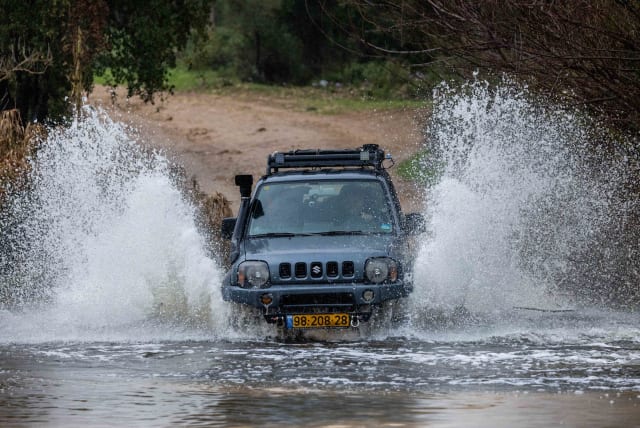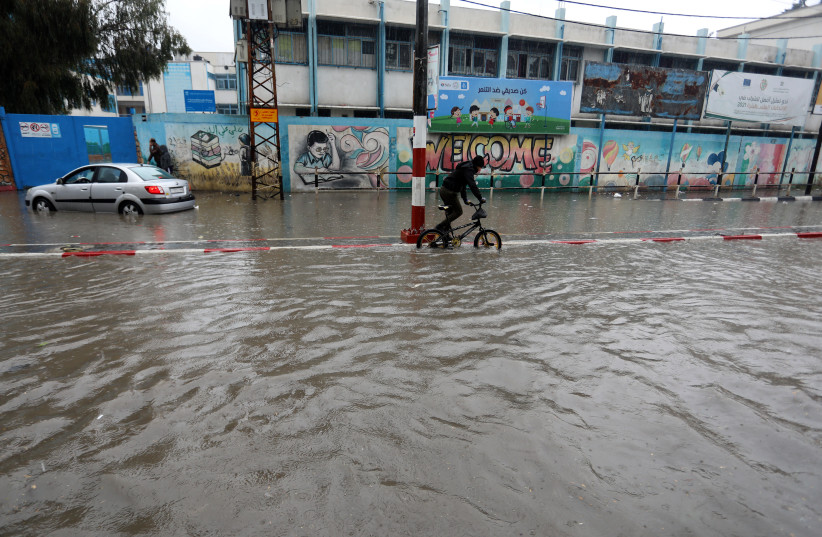Israeli winter: Ahead of expected thunderstorms, MDA is helping you stay safe

MDA CEO Eli Ben said: "The [MDA] teams are prepared to provide medical treatment to any [person in need] even in complex weather conditions."
Magen David Adom (MDA) released a statement on Monday warning Israeli citizens to take the appropriate precautions in light of expected inclement weather beginning on Monday evening.
Israel is expected to experience thunderstorms, flooding and sandstorms in various regions across the country.
MDA CEO Eli Ben said: "The [MDA] teams are prepared to provide medical treatment to any [person in need] even in complex weather conditions."
According to its statement, MDA has prepared ambulances equipped with four-wheel-drive, in addition to special "Jeep-bulances" which are off-road vehicles designed to handle medical transport. Drivers have been given specific instructions for safe driving in inclement weather.
What is more, the organization intends to increase the number of people working on each shift in anticipation of the fact that more people will require their services.
"I am asking the public to increase awareness of the dangers that may arise as a result of the weather and to be in contact with family members and elderly neighbors in order to make sure that they are protected from the cold," said CEO Eli Ben in a statement. "For any medical needs, the MDA forces can be contacted by calling 101 or using the 'My MDA' application, through which the medics and paramedics will identify your exact location.
MDA also released guidelines for staying safe during intense rain:
Injury from severe cold
The main signs of hypothermia are lethargy, irregular behavior and poor judgment, muscle tremors, slow or irregular pulse, decreased motor control, lowered breathing rate, and pale or blue-tinted skin. If the patient is wet, they should be put in dry clothes as soon as possible and put in warm surroundings. In the case of frostbite, the patient is expected to feel a sensation of coldness in the limbs, pain and a feeling of paresthesia (pins and needles). In such a case, pour lukewarm (not hot) water on the cold limb and secure it (in a splint or fixed position). Do not massage it.
Contact the elderly family members and neighbors
Special care should be given to elderly relatives and neighbors who live alone; make sure that they are protected from the cold and stormy weather. If possible, they should be assisted with daily chores (such as food shopping, bringing them medicine from the pharmacy, etc.) that include leaving the house to brave the cold weather outside.
Preservation of body heat
Infants, the elderly and those who are immunocompromised are likely to lose body heat at a faster rate than the average person. They should be dressed in layers of light clothing, which will allow comfortable movement. Cover those who are bedridden (or infants who are unable to manipulate their own surroundings) with a light blanket and make sure their room is heated to a temperature of about 24 degrees.
Do not cover babies with too many layers or a heavy blanket, as this can lead to suffocation.
Electrical appliances and heating
Check that the heating apparatuses in the house are in good condition and suitable for use, and beware of the danger of carbon monoxide (CO2) poisoning. CO2 gas can be emitted as a result of using a gas stove or certain kinds of fireplaces. It is a colorless and odorless gas, and its presence usually goes undetected until it has already impacted people's health (barring the use of an in-home carbon monoxide detector).
While operating the heating, make sure there is adequate ventilation, and do not use improvised heating devices.
Keep electrical appliances away from wet floors and keep a close eye on electrical appliances in the bathroom and kitchen. Avoid proximity to electrical poles that have collapsed and exposed electrical wires.
In the event of experiencing signs of CO2 poisoning, such as dizziness, nausea, vomiting, fatigue, weakness and a general feeling of malaise, and in severe cases of loss of consciousness, the heating system must be immediately shut off, the house ventilated and the MDA immediately called by calling the emergency number 101 or using the 'My MDA' app.
Strong winds, flooding and driving in the rain
Strong winds can cause objects that are usually stationary, like potted plants and road signs, to fly up and endanger those nearby. Care must be taken to secure outdoor furniture, clotheslines and any other objects near the home to reduce the overall risk of harm.
In places where there is a danger of sandstorms, those suffering from respiratory diseases are advised to stay in closed places.
In the event of flooding, do not attempt to drive through large puddles, as they can be much deeper than they seem. Travel to and in flood areas should be generally avoided.
In addition, during floods, one should avoid using elevators located in parking lots, at the ground level and below. If there is flooding in one's house, immediately disconnect the electricity in the home to avoid electrocution.
If you live in an apartment below ground level - leave the house immediately and move to safe places above ground level, where the rescue teams will be able to spot you and help if necessary.
Do not cross large pools of water and places with strong water flow (even with off-road vehicles) - this is a real danger! Do not cross flooded roads as the depth of the water poses a genuine threat to life.
Drive safely, slowly and rarely
On rainy days and especially when it rains heavily, the roads are very slippery, and the danger of slipping is ever-present even at low speeds. Take care to keep a greater distance than usual from the vehicle in front of you, and to drive at a low speed and in accordance with the road conditions.
Make sure to ventilate the vehicle and defrost the windows regularly. Drivers must make sure to turn on their headlights, especially when visibility is poor.
Jerusalem Post Store
`; document.getElementById("linkPremium").innerHTML = cont; var divWithLink = document.getElementById("premium-link"); if (divWithLink !== null && divWithLink !== 'undefined') { divWithLink.style.border = "solid 1px #cb0f3e"; divWithLink.style.textAlign = "center"; divWithLink.style.marginBottom = "15px"; divWithLink.style.marginTop = "15px"; divWithLink.style.width = "100%"; divWithLink.style.backgroundColor = "#122952"; divWithLink.style.color = "#ffffff"; divWithLink.style.lineHeight = "1.5"; } } (function (v, i) { });

